|
Mariinsky Theatre |
ПО-РУССКИ |
|||||||||
|
In this issue of our monthly
|
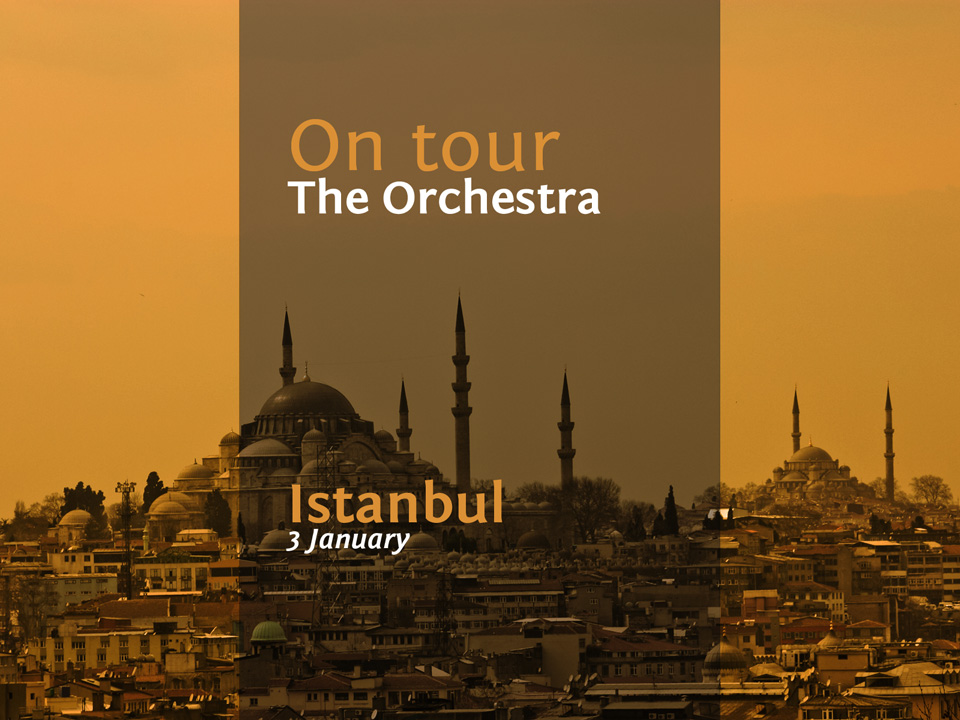
Photo: © Vikram Pamddoss
| Istanbul, İş Sanat Concert Hall 3 January, Tuesday, 8:00PM | |
| Wagner Prelude to Lohengrin Tchaikovsky Piano Concerto No. 1 Berlioz Symphonie Fantastique | |
| Mariinsky Theatre Symphony Orchestra Soloist: Daniil Trifonov Conductor: Valery Gergiev | |
| Learn more on the İş Sanat Concert Hall |
In 2012, the tour schedule of our theater started on January 3rd — the Mariinsky Theatre Symphony Orchestra and Valery Gergiev went to Istanbul, where they played a single concert on stage of one of the most prestigious cultural centers in Istanbul — İş Sanat. The concert featured pianist Daniil Trifonov, 1st Prize and Grand Prix Winner of the 14th International Tchaikovsky Competition. He played solo part in Tchaikovsky’s First Piano Concerto, which he previously performed with our orchestra in St Petersburg and on tours in New York (at the Carnegie Hall), Astrakhan (at the opening of a new Opera House) and Baden-Baden (at the Festspielhaus). This year we are planing to release a recording of Tchaikovsky’s First Piano Concerto on the Mariinsky Label, the record label of the Mariinsky Theatre.
BTW: Symphonie Fantastique by Hector Berlioz, which we played in Istanbul, will also be performed on tour by the Mariinsky Theatre Symphony Orchestra in Italy: on February 2nd — at the Teatro Communale Luciano Pavarotti in Modena, and on February 3rd — at the Auditorium Giovanni Agnelli Lingotto in Turin.
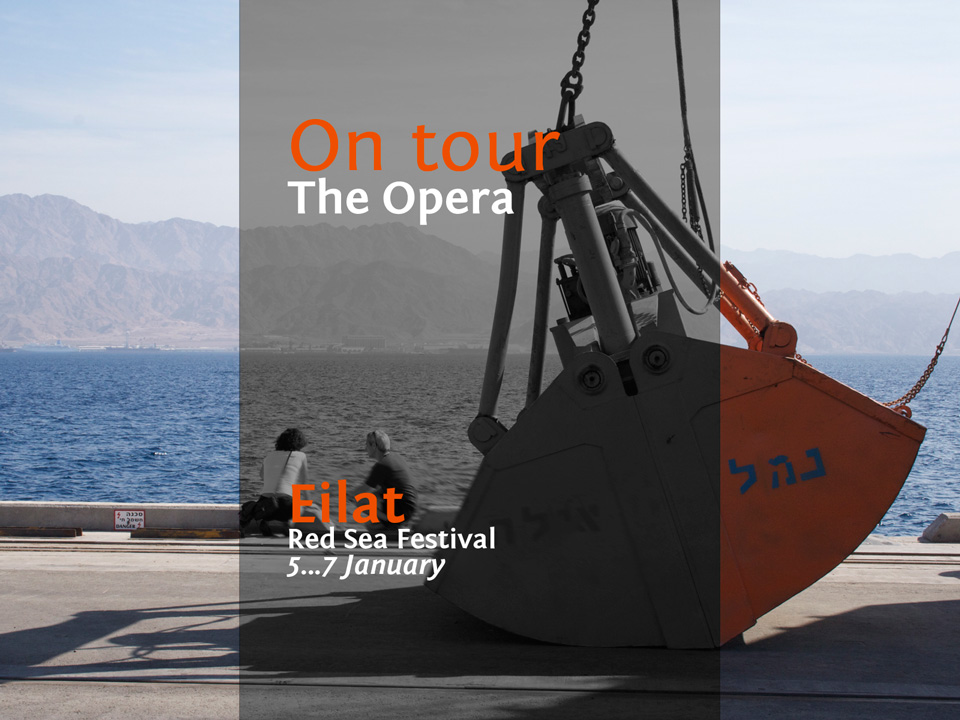
| Eilat, Red Sea Festival | |
| 5 January, Thursday, 9:30PM Berlioz Requiem | |
| 6 January, Friday, 9:00PM Prokofiev The Fiery Angel | |
| 7 January, Saturday, 9:00PM Beethoven Symphony No. 9 | |
| Mariinsky Theatre Soloists, Chorus and Symphony Orchestra Conductor: Valery Gergiev | |
| Learn more on the Red Sea Festival |
From January 5th to 7th, the orchestra, the chorus and soloists of the Mariinsky Theatre and Valery Gergiev performed in Eilat. This Israeli resort city held the 11th Red Sea Festival of classical music. The Festival was founded by Valery Gergiev as an international music project, the aim of which is to promote the peaceful resolution of conflict in the Middle East. It was not by chance that Eilat was chosen to host the event as it is located in a unique geopolitical region on the border of four states — Jordan, Egypt, Saudi Arabia and Yemen. Despite the “frontline conditions” Valery Gergiev decided to risk starting a new festival in a place where there had never been any festival traditions similar to those in Europe before, and he transformed Eilat into a true festival city to which lovers of classical music from all over the world come every year.
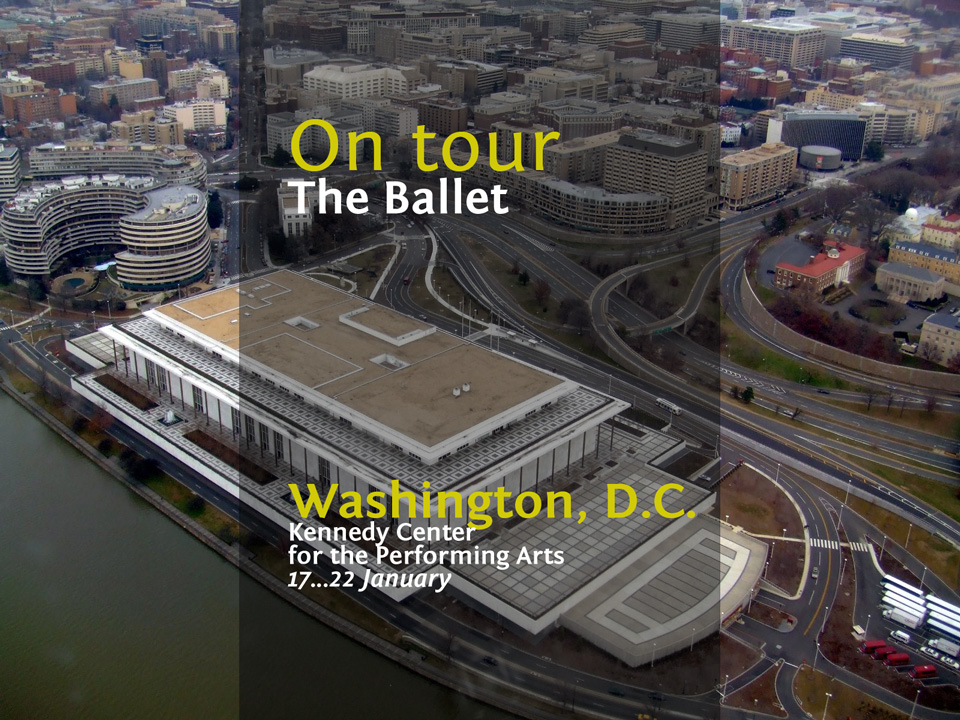
Photo: © Estoymuybueno
| Washington D.C., The Kennedy Center for the Performing Arts 17 January, Tuesday, 7:30PM 18 January, Wednesday, 7:30PM 19 January, Thursday, 7:30PM 20 January, Friday, 7:30PM 21 January, Saturday, 1:30PM 21 January, Saturday, 7:30PM 22 January, Sunday, 1:30PM | |
| Chopin/Fokine Chopiniana Rimsky-Korsakov/Fokine Shekherazade Stravinsky/Fokine The Firebird | |
| The Mariinsky Ballet | |
| Learn more on the Kennedy Center for the Performing Arts |
From January 17th to 22nd the Mariinsky Ballet will be on tour at the Kennedy Center for the Performing Arts in Washington, D.C. This current visit celebrates one decade of collaboration between the Mariinsky Ballet and the Kennedy Center. To mark the event the Mariinsky Theatre will be presenting a program of Les Saisons Russes that will feature three famous ballets by Michel Fokine: Chopiniana, Schéhérazade and The Firebird, which Sergei Diaghilev brought to Paris in the early 20th century. The tour is being hosted by the Kennedy Center Opera House, the Center’s second largest venue which seats 2362 people. The theatre was designed to accommodate ballets, operas and musicals. Amongst its treasures are the luxuriant Japanese stage curtain and the dazzling crystal chandelier made by the Austrian company Lobmeyr.
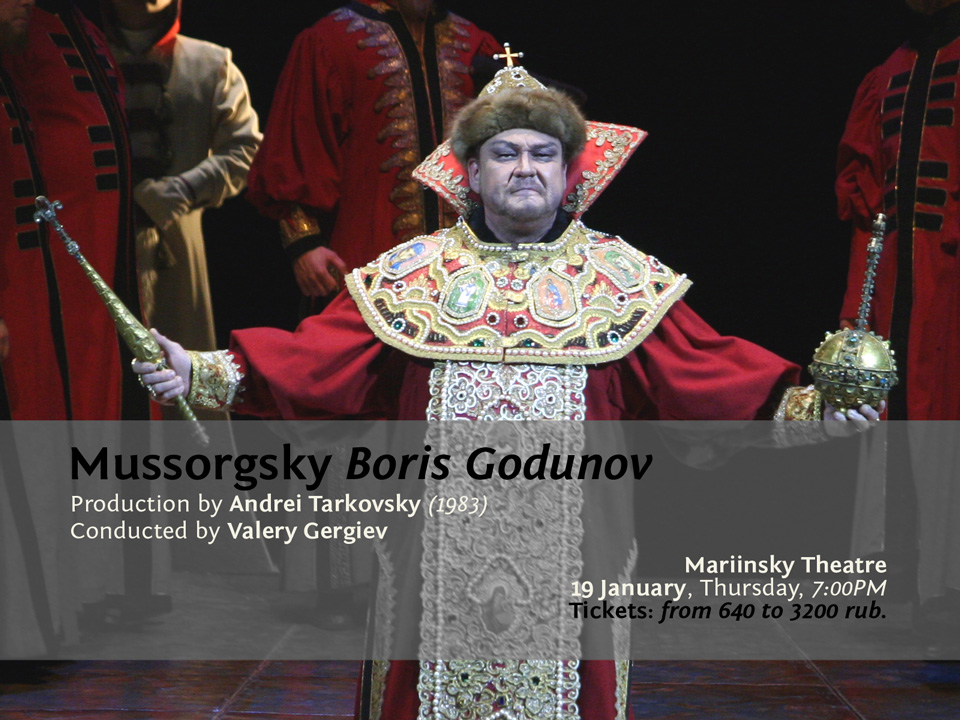
Photo: © Mariinsky Theatre | Natasha Razina
| Mariinsky Theatre | |
| Mussorgsky Boris Godunov | |
|
Opera in four acts with a prologue (1872 version) Stage Production by Andrei Tarkovsky (1983) Conductor: Valery Gergiev | |
| 19 January, Thursday, 7:00PM | |
| Learn more | about this performance |
| Tickets | on the Mariinsky |
On January 19th, we are presenting by one of the most famous Russian operas at the Mariinsky Theatre: Boris Godunov by Mussorgsky. We do not perform this opera on our stage that often, as we want to mark an importance of the event. Far not every world-class opera company would be able to perform this Mussorgsky’s masterpiece as it requires a great team of strong soloists that represent so many different and unique characters, a powerful chorus that could perform large-scale folk scenes of the opera, an orchestra that perfectly understands the musical language of this work, a conductor who would have a great sense of such music and able to lead the team, building up a very special interpretation of the musical drama. The January performance at the Mariinsky Theatre will feature the 1872 version (the one, which is the most complete), in a famous production by Andrei Tarkovsky, which was originally created for the Royal Opera House, Covent Garden in 1983, and is considered by many to be one of the most inspired, filled with drama, interpreting the famous Pushkin’s tragedy in the music of Mussorgsky.
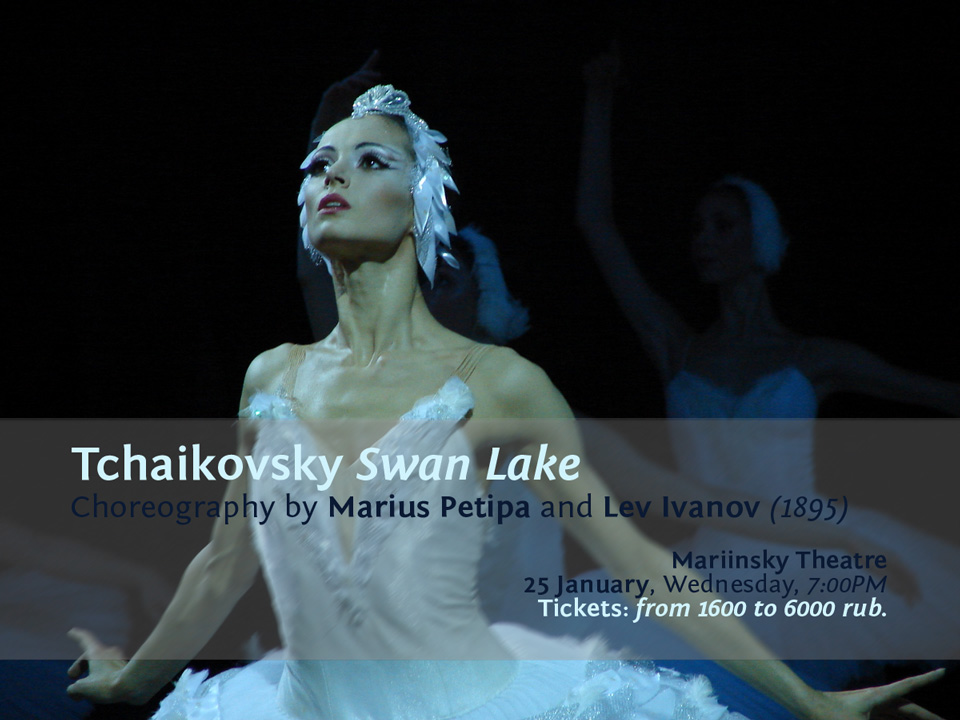
Photo: © Mariinsky Theatre | Natasha Razina
| Mariinsky Theatre | |
| Tchaikovsky Swan Lake | |
|
Ballet in three acts Choreography by Marius Petipa and Lev Ivanov (1895) revised by Konstantin Sergeev (1950) | |
| 25 January, Wednesday, 7:00PM | |
| Learn more | about this performance |
| Tickets | on the Mariinsky |
The most famous ballet — Tchaikovsky’s Swan Lake in its St Petersburg version choreographed by Marius Petipa and Lev Ivanov in 1895 and revised by Konstantin Sergeev in 1950 — will be presented on stage of Mariinsky Theatre once again. January 25th will see the first performance of the ballet this season. Last time it was performed at the Mariinsky Theatre seven months ago (!), in June 2011. Over the recent months, the Mariinsky Ballet had presented this masterpiece, which, without doubt, is a landmark production of the Mariinsky Theatre, on tour in London (during a three-week residency at the Royal Opera House, Covent Garden), in Brazil (São Paulo, Rio de Janeiro and Belo Horizonte), in Turin (during a three-week residency at the Teatro Regio), in Baden-Baden (during our annual week-long residency at the Festspielhaus) and in Muscat (at the newly built Royal Opera House in Oman). Following its single performance in St Petersburg this month, the production will be presented on tour in Darmstadt (Germany), and will be perfrormed at the Mariinsky Theatre again in early March.
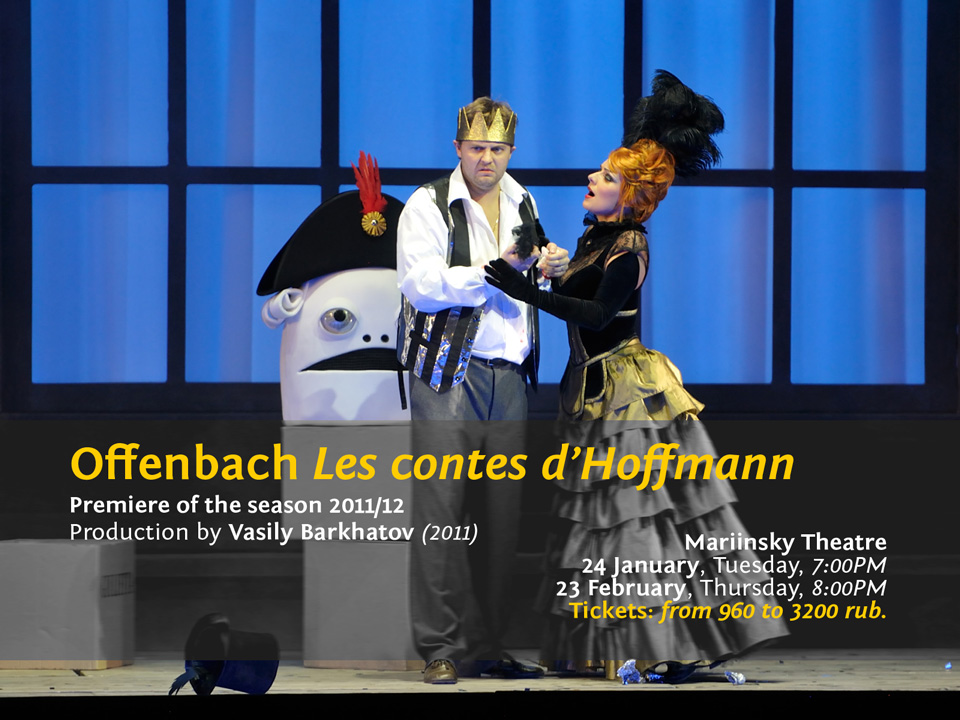
Photo: © Mariinsky Theatre | Valentin Baranovsky
| Mariinsky Theatre | |
| Offenbach Les contes d’Hoffmann | |
| Opéra fantastique in five acts Stage Production by Vasily Barkhatov (2011) | |
| 24 January, Tuesday, 7:00PM | |
| Learn more | about this performance |
| Tickets | on the Mariinsky |
| 23 February, Thursday, 8:00PM | |
| Learn more | about this performance |
| Tickets | on the Mariinsky |
Jacques Offenbach’s opera Les contes d’Hoffmann became the first opera premiere of the current season,
which was presented at the Mariinsky Theatre last month. The opera, which has a fateful reputation and its score has multiple versions, was brought back
to the Mariinsky Theatre repertoire 11 years later since its previous production. This time it was created by a team that is familiar
to St Petersburg audiences and received numerous theatrical awards in Russia: director Vasily Barkhatov, stage designer Zinovy Margolin
and costume designer Maria Danilova. According to Vasily Barkhatov, Les contes d’Hoffmann is “a drama of a man
who conjures up a dream, gives it a woman’s name and becomes lost in painful reveries. Hoffmann becomes transformed from
an impressionable artist into the most ordinary of men — not free, it is true, to cross the border between his own imagination and reality.
The protagonist, experiencing the drama of love and grasping the fact that he is no Jimmy Hendrix, so to speak, becomes
a
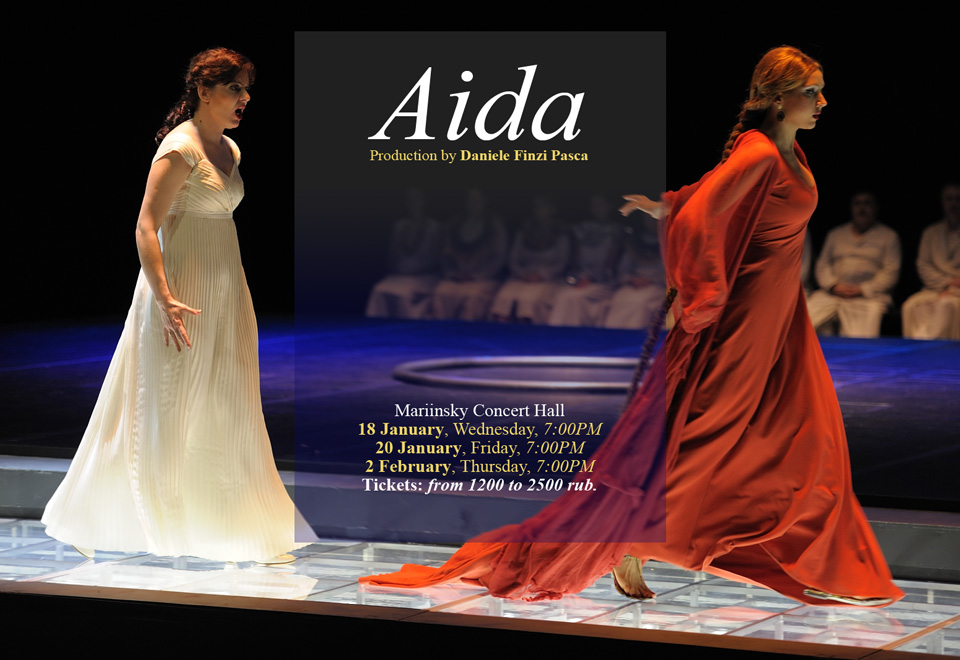
Photo: © Mariinsky Theatre | Valentin Baranovsky
| Mariinsky Concert Hall | |
| Verdi Aida | |
|
Opera in four acts Stage Production by Daniele Finzi Pasca (2011) | |
| 18 January, Wednesday, 7:00PM | |
| Learn more | about this performance |
| Tickets | on the Mariinsky |
| 20 January, Friday, 7:00PM | |
| Learn more | about this performance |
| Tickets | on the Mariinsky |
| 2 February, Thursday, 7:00PM | |
| Learn more | about this performance |
| Tickets | on the Mariinsky |
One of the absolute favourites of the previous season, premiered at the Stars of the White Nights Festival — Verdi’s opera Aida, directed by Daniele Finzi Pasca, especially for the stage of the Mariinsky Concert Hall. One can watch the opera from all sides, in fact, being involved into action. The production is enriched with a variety of theatrical, circus, acrobatic and flashy lighting effects (a special brand new equipment was installed to implement these). It gives a non-standard and, at the same time, quite simple approach to the story: the production calls for peace and proposes a life without war or violence. Both the production and its director Daniele Finzi Pasca are nominated for the highest Russian National Award of the Golden Mask Festival, and Ekaterina Semenchuk is nominated in the category Best Female Role in the Opera for the part of Amneris. The performance of Aida on January 20th will be conducted by Valery Gergiev.
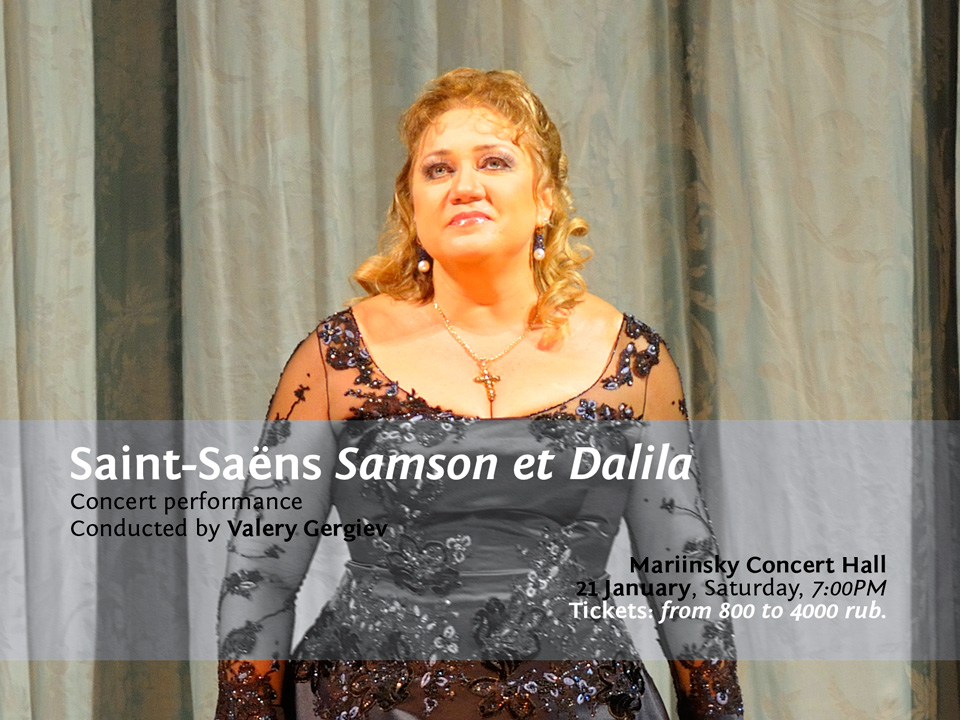
Photo: © Mariinsky Theatre | Valentin Baranovsky
| Mariinsky Concert Hall | |
| Saint-Saёns Samson et Dalila | |
|
Opera in three acts Concert performance Conductor: Valery Gergiev | |
| 21 January, Saturday, 7:00PM | |
| Learn more | about this performance |
| Tickets | on the Mariinsky |
On January 21st at the Mariinsky Concert Hall we are presenting Samson et Dalila, an opera-oratorio by Camille Saint-Saёns. It is justly considered one of the most remarkable masterpieces of French music. This is the most popular opera Saint-Saёns had composed. When he started to work on it, he intended to write an oratorio, but his librettist convinced him of the theatrical potential of his work. The opera is famous for its spectacular arias of the main character — Dalila, the Philistine. This part is one of the most popular in the whole of mezzo-soprano repertoire. First performance and staged production of this opera in Russia were connected with St Petersburg. In Russia it was first performed in 1893 in St Petersburg in the performance of a French company. The Russian premiere took place three years later at the Mariinsky Theatre.
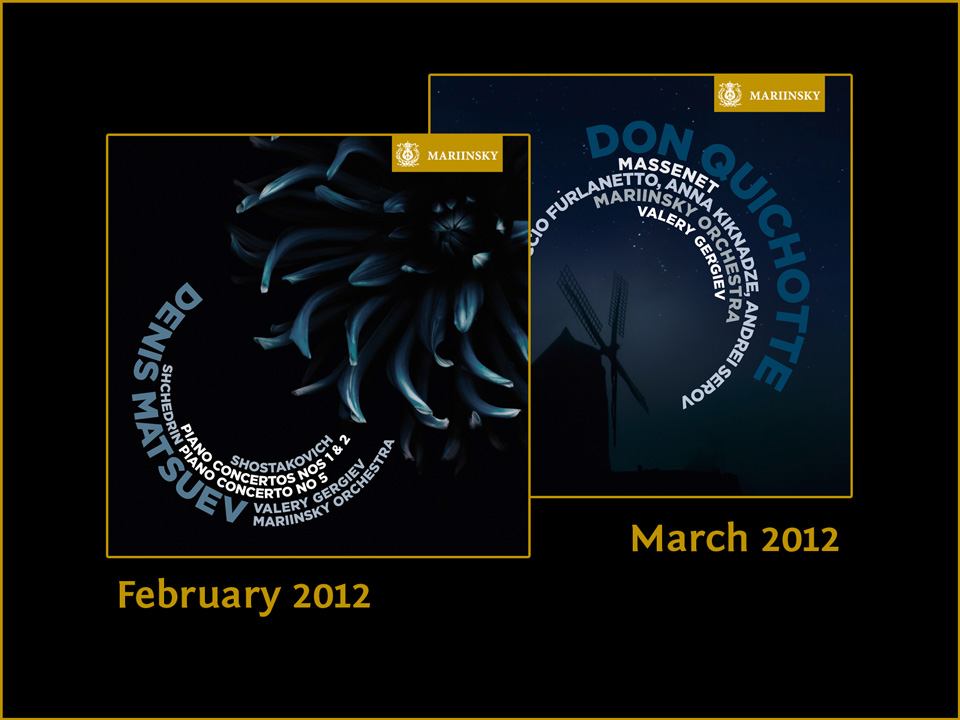
| Mariinsky Label, SACD Recorded in December 2009 and in December 2010 To be released in February 2012 | |
| Shostakovich Piano Concertos Nos. 1 & 2 Shchedrin Piano Concerto No. 5 | |
| Mariinsky Theatre Symphony Orchestra Soloist: Denis Matsuev Conductor: Valery Gergiev |
In early February, we will release our next recording on the Mariinsky Label, the record label of the Mariinsky Theatre. The disc will feature recordings of two Piano Concertos by Dmitri Shostakovich and Fifth Piano Concerto by Rodion Shchedrin. Denis Matsuev plays solo parts in all three works, alongside the Mariinsky Theatre Symphony Orchestra conducted by Valery Gergiev.
Despite being a prolific symphonist, Shostakovich only wrote two piano concertos. His First Piano Concerto features a prominent solo trumpet part which provides dialogue with the piano and an independent voice “commenting” on the music of the piano and orchestra. Shostakovich draws in numerous musical styles within the work and displays his usual wit and sardonic humour.
The Second Piano Concerto, by contrast, is more unified, and is unusually happy and optimistic in nature for Shostakovich. This may be because it was written for his son, who gave the première, and has been described as showing “the composer as though his own youth had returned to him”. The slow movement contains some of Shostakovich’s most achingly beautiful music — almost Rachmaninov-like in its romanticism.
Rodion Shchedrin has so far composed six piano concertos, each signifying a new phase in his compositional development, as well as a double concerto for piano and cello and a substantial corpus of solo piano works. His Fifth Piano Concerto is influenced by the music of both Shostakovich and Prokofiev.
BTW: Denis Matsuev and the Mariinsky Theatre Symphony Orchestra under Valery Gergiev had previously released an SACD on the Mariinsky Label with the works by Sergei Rachmaninov: Third Piano Concerto and Rhapsody on a Theme of Paganini. For two years since its release, the disc has become one of the most popular records of the label.
| Mariinsky Label, SACD Recorded in May 2011 To be released in March 2012 | |
| Massenet Don Quichotte | |
| In the part of Don Quichotte: Ferruccio Furlanetto Soloists of the Mariinsky Opera and of the Mariinsky Young Opera Singers Academy Mariinsky Orchestra Conductor: Valery Gergiev |
This March will see a further release on the Mariinsky Label — a recording of Jules Massenet’s opera Don Quichotte, that tells the story of adventures that occur with the noble knight and his faithful friend Sancho Panza, of his love for the beautiful Dulcinea and of his tragic death. The role of Don Quichotte was one of the most notable achievements of the Russian bass Feodor Chaliapin, for whom the part was specifically conceived.
Don Quichotte will become the sixth opera released on the Mariinsky Label (the other five being The Nose by Shostakovich, The Enchanted Wanderer by Shchedrin, Oedipus Rex by Stravinsky, Parsifal by Wagner and Lucia di Lammermoor by Donizetti). The title role on this record is performed by a famous bass Ferruccio Furlanetto, for whom the role of Don Quichotte presents one of the most significant achievements in his extensive musical career.
|
Main information
Official |
Beyond the stage |
Contact us
|